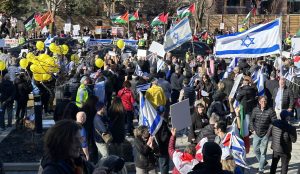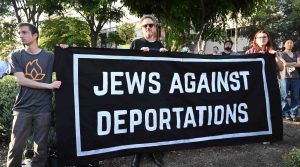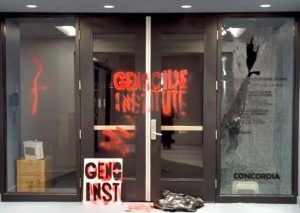More than 18 Toronto Jewish institutions, and one mosque, requested and were granted safe access zones under the new city bylaw preventing protests within 50 metres of entrances to those buildings.
The bylaw came into force on July 2, and the one-year period for the approved measures began as early as July 10 at some addresses, according to the City of Toronto website registry, which lists the “safe access” (or “bubble”) zones established based on the requests.
From Jewish daycares and synagogues to a number of day schools, the institutions that applied are mainly concentrated in the northern end of the city along Bathurst Street known for several Jewish neighbourhoods.
The “bubble zone” bylaw, passed by Toronto council in May, was preceded by months of debate and compromises. It prohibits demonstrations and “forms of discouragement of attendance” within 50 metres of vulnerable infrastructure, specifically schools, childcare centres and houses of worship, with infractions subject to fines of up to $5,000.
Other municipalities in the Greater Toronto Area including Oakville, Mississauga, and Brampton have passed or are considering similar bylaws, as well as in Ottawa, Hamilton, and Calgary. Provincial court challenges have now been launched against the bylaw in Vaughan, where the distance restriction is 100 metres, subject to a fine of up to $100,000; and in Calgary, where a bylaw prohibiting demonstrations near city-owned community centres and libraries faces an Alberta court challenge with opponents calling it an overreach, and unconstitutional.
The Canadian Civil Liberties Association (CCLA), which filed the suit against Vaughan in Ontario court, argues that bylaw seeks to limit dissent and protest and deliberately cause a chilling effect. The CCLA also wrote a letter to Toronto city councillors in opposition to passing the city bylaw, in May.
Applications for the Toronto “safe access zones,” which are now online on the city’s website, involve about four or five short steps, one of which is a simple checking off of a box attesting that the applicant “reasonably believes” prohibited activities within the zone may occur on city property (like sidewalks) within 50 metres from the boundaries of the property.
Also prohibited are “a person expressing an objection or disapproval towards any person based on race, ancestry, place of origin, colour, ethnic origin, citizenship, religion/creed, sex, sexual orientation, gender identity, gender expression, age, marital status, family status, disability or the receipt of public assistance by any means, including graphic, verbal or written means,” the statement reads.
Enforcement of the bylaw’s established zone appears to fall to both Transportation Services and Toronto Police Services, according to a statement from the City of Toronto. (The “safe access zone” bylaw is actually an amendment to the Toronto bylaw governing streets and sidewalks, and access to them.)
City bylaws related to the public right-of-way are handled by Transportation Standards officers, explains Russell Baker, spokesperson for the city.
“Transportation Standards Officers are not trained for crowd control and do not possess arresting powers… [they] do not respond to disorderly behavior or criminal activities,” wrote Baker in a statement to The CJN.
“Matters regarding public safety and conduct that violates the Criminal Code of Canada are referred to the Toronto Police Service as the primary responder as appropriate and will continue to support the City in facilitating safe access to public spaces.”
Baker confirms the city is publishing the addresses of the established zones, or “access areas,” to let the public know where they are in effect.
The CJN reached out to several of the institutions that applied and were granted safe access zones to learn why they chose to apply.
Michael Cohen, the executive director of Adath Israel Synagogue, says the application process was fast – an email immediately acknowledges submission of the web form request, soon followed by a second message confirming the safe access zone.
“I received an immediate response acknowledging receipt [of the application], and then I received another email, I think it may have even been later that day, indicating we’ll be granted the one-year status,” said Cohen.
The application was an easy decision, he told The CJN in an interview.
“Like other organizations in the city – a recreational facility or [another facility] – safety and security is at the top of all of our [minds]. This seems like a very logical additional step that we would take to protect our space, and our people.”
It was Cohen who spread the word to several other synagogue leaders, encouraging them to apply, Candace Vogel, executive director of Beth Emeth Synagogue, told The CJN. She said she found the process “very prompt.”
“It was very easy. I got a confirmation, and apparently somebody’s going to bring a sign at some point which of course we will post,” Vogel said.
The email acknowledging receipt of the request tells applicants: “The City may require you to post signage” once a safe access zone is established.
Vogel said she appreciates that the city is at least acknowledging the Jewish community’s needs.
“It’s not enough, but it’s a start,” she said. “And I will say that we have not been subject to any disturbances or protests.”
Still, Beth Emeth is one of a number of institutions in the neighbourhood that received the designation.
“We’re concentrated in a fairly small area” with other Jewish community organizations who have applied and been granted “bubble” or safe access zones, she said, including TanenbaumCHAT, the Jewish high school, across the street from the synagogue.
“It’s more of a preemptive measure than anything else,” said Vogel about applying for the safe access zone.
“I’m grateful for the fact that we have largely been ignored, which is exactly how I’d like to continue on… but any protections that are being offered, we want to take advantage of.”
Several Jewish day schools, daycares, and preschools, as well as other synagogues also applied for and received the safe access zone designation. The CJN reached out to Ridley Orchard School, on Avenue Road, which does not appear to be an obviously Jewish institution, to ask about the application for the designation, but did not receive a reply by press time.
Pride of Israel Synagogue, the one shul within city limits where a raucous protest took place last year, also received the safe access zone designation, according to the city registry.
Last year, protesters called out elected officials who were attending a solidarity event, a month after the synagogue’s windows were smashed. Protesters said many of the politicians at the event, including Mayor Olivia Chow, had along with Toronto Police been “responsible for a lot of hate that has happened …to the pro-Palestinian community,” since the Oct. 7, 2023 Hamas attacks in Israel and ensuing war in Gaza, a demonstrator told The CJN.
The CJN reached out to Pride of Israel for comment but did not receive a response before press time.
The Jewish Russian Community Centre (JRCC) at Rockford Road and its nearby daycare also applied for a bubble zone designation. Rabbi Shmuel Neft, the director of JRCC Rockford, says he is “cautiously optimistic about being cautiously optimistic” when it comes to the new bylaw.
He applied because it took such little effort, and there was no downside to doing so.
“If it’s available, use it. Whatever it’s worth, doesn’t hurt. But I don’t see that as being a tacit thumbs up of approval to the city of Toronto. It’s not at all,” he said. “Previous experience has shown that the city of Toronto is really, really good at virtue signaling, and that’s about the extent to what they’re going to do.”
The previous experience that Rabbi Neft referred to was the police’s failure to investigate repeated break-in attempts that occurred three years ago. At that time, Rabbi Neft had surveillance footage from two consecutive nights of someone trying to break into the JRCC building.
However, he found it was impossible to even make a report to the police. The only option was to call a hotline, where he was stuck on hold for several hours before giving up and looking for a workaround. He rallied community members to make complaints, and eventually they made enough noise for the police to investigate.
The whole incident left Rabbi Neft with a lack of faith in the city’s ability to enforce its laws. He has great respect and appreciation for individuals who work in law enforcement, he says, but laments their lack of resources and the complicated orders that make their job more difficult.
“The police are stretched way too thin,” he said. “I don’t see what the new law is going to do with regards to deterring people from coming here and doing whatever they want to do because I don’t see how this is actually going to be enforced in a way that would actually deter people from doing this kind of stuff.”
As of July 15, the following institutions have been approved for “bubble zones”, creating a protest-free area of 50 metres, according to the City of Toronto: Beth Tzedec Congregation/Robbins Hebrew Academy; Associated Hebrew Schools, Neptune and Finch Avenue Campuses; Beth Radom Congregation; Ridley Orchard Preschool; Holy Blossom Temple; The Leo Baeck Day School; Kehillat Shaarei Torah; Eitz Chaim Schools; Beth Tikvah Synagogue; Pride of Israel Synagogue; Bnei Akiva School and Nachman Sokol Torah Centre; Beit Midrash Zichron Dov; Toronto Heschel School; TanenbaumCHAT; Bialik Hebrew Day School; Gan Chabad Preschool, Beth Jacob Synagogue; Ohr Menachem JRCC Daycare; Jewish Russian Community Centre; Adath Israel Synagogue; Beth Emeth Bais Yehuda Synagogue; Toronto and Region Islamic Congregation; B’nai Torah Synagogue.
Authors


Jonathan Rothman is a reporter for The CJN based in Toronto, covering municipal politics, the arts, and police, security and court stories impacting the Jewish community locally and around Canada. He has worked in online newsrooms at the CBC and Yahoo Canada, and on creative digital teams at the CBC, and The Walrus, where he produced a seven-hour live webcast event. Jonathan has written for Spacing, NOW Toronto (the former weekly), Exclaim!, and The Globe and Mail, and has reported on arts & culture and produced audio stories for CBC Radio.
View all posts








